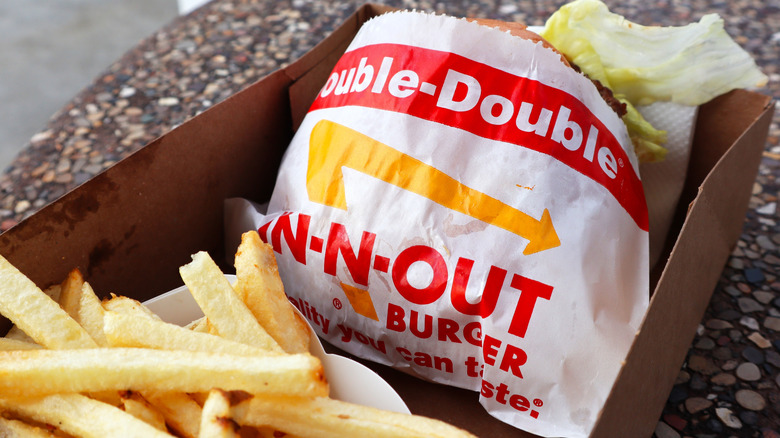Why Some People Don't Think It's Ethical To Eat At In-N-Out
Ina Garten's preferred drive-thru order is an In-N-Out burger, and Anthony Bourdain similarly regarded the chain as his favorite fast food. In-N-Out has achieved something of a cult mythos to those not lucky enough to be living in the states that have one, a popularity that causes out-of-towners to flock there and take celebratory snaps for social media as they down Double-Double burgers and animal-style fries.
The quality behind the food at In-N-Out is one of the chain's big draws, with it able to boast that its never-frozen burger patties are free of preservatives and additives. The menu is simple, but very customizable. And, yet, there are those who refuse to partake in the burgers and fries at In-N-Out... and the reason is due to the chain's hazy stance on antibiotic use in its beef.
In 2016, In-N-Out was taken to task by a coalition of public interest groups regarding the use of antibiotics in beef cattle, which health experts worried could cause a rise in antibiotic resistance among the humans who ate said meat. There are widespread fears that increased antibiotic resistance in humans could cause the genesis of "superbugs," or bacteria that are immune to the life-saving antibiotics on the market today. This isn't paranoia, either — in 2023, the World Health Organization published a report referring to antibiotic resistance as "one of the top global public health and development threats" and blaming it for millions of worldwide deaths.
How has In-N-Out responded to the controversy?
Opponents of In-N-Out's meat containing antibiotics have been disappointed by the chain's response to criticism and plans to deal with it, which some feel are wishy-washy. In 2016, following the public interest furor, In-N-Out released a statement that they would be moving away from sourcing beef from suppliers who use antibiotics, although it conspicuously did not state a timeline for this happening. Two years later, CALPIRG, one of the groups that had taken In-N-Out to task, drubbed the chain with an inglorious "F" grade when it came to the subject of antibiotic use.
Notably, McDonald's and several other big names in burgers also failed the evaluation. In 2020, In-N-Out again reaffirmed an intent to start sourcing beef raised without antibiotics, although the actionable objectives again seemed murky. As recently as the start of 2025, social media users were still upset that In-N-Out was feeding them burgers containing antibiotics, leading us to wonder if In-N-Out intends to ever actually address the matter.
Is a burger a sandwich? That's a controversial topic, but not one as controversial as the use of antibiotics when raising cattle. As consumers, it's the job of each one of us to do our own research and risk assessment concerning the topic of eating antibiotic-treated beef, and to make informed decisions about our health and willingness to spend money at chains that may not align with our own standards.

